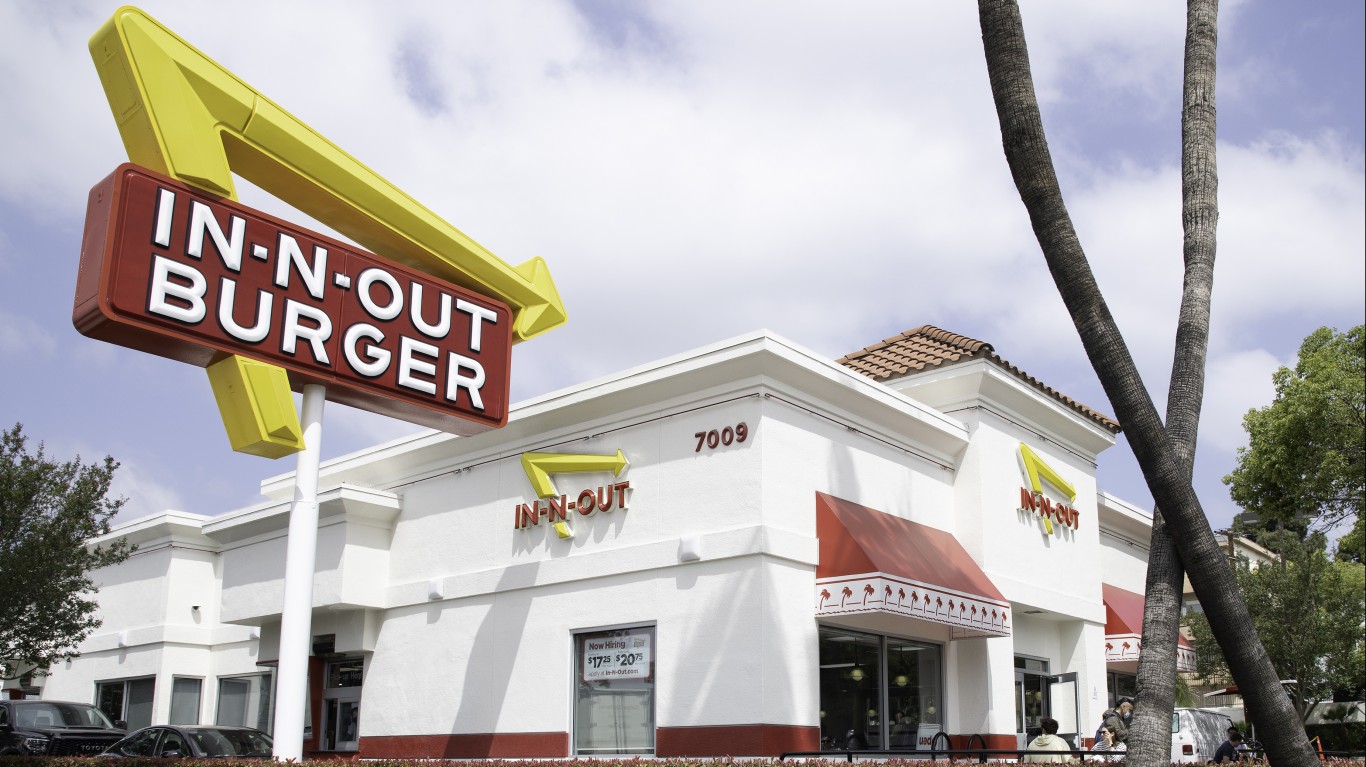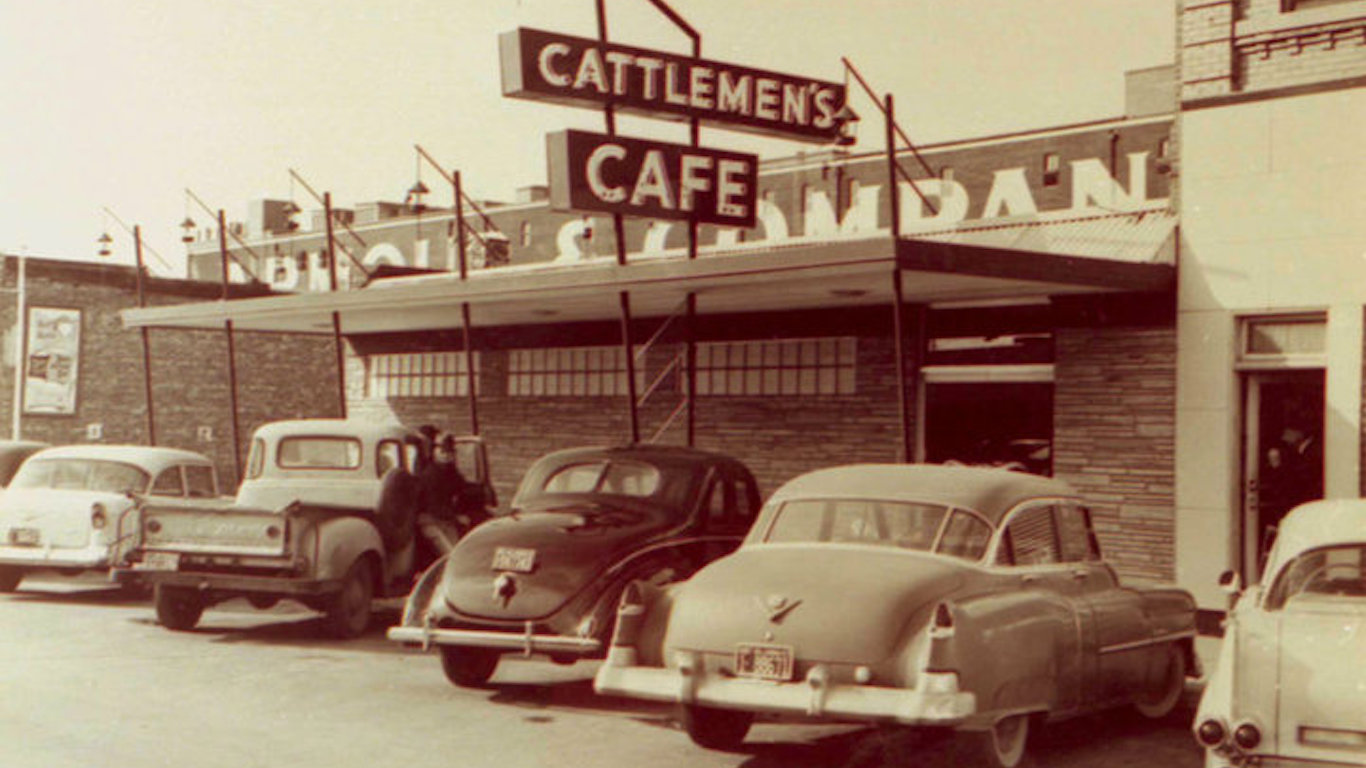
The restaurant business is a tough one, and the COVID-19 pandemic has all but destroyed it. Even before closures became mandatory, restaurants came and went with regularity. Statistics on restaurant failure rates vary widely. One estimate suggests that up to 90% of independent eating places close within their first year of operation.
Unmanageable rent increases, changes in customer demographics or consumer tastes, fires or the effects of natural disasters, and the deaths and divorces (or simply retirement) of owners are among the many reasons that even thriving eating places fail.
When we encounter a restaurant, then, that has been around for 50 years, or a century, or even longer, it’s impressive. They must be doing something right. These are, for example, America’s greatest roadside restaurants.
Not counting coffeehouses, bars, and hotel dining rooms serving table d’hôte meals (those with limited choice served to guests at a fixed price and time), the first real restaurant in America was almost certainly Delmonico’s in New York City, first opened as a pastry shop in 1827 and expanded into a full-scale restaurant on the French model three years later.
24/7 Tempo has assembled a list of 18 restaurants around America that opened after Delmonico’s started doing business and that, as far as contemporary research can determine, were concerned with food as well as drink from the beginning, even if they opened as taverns or saloons.
Most of these venerable establishments have gone through many changes over the decades. Menus have evolved, owners have come and gone, locations have shifted; sometimes they’ve even been destroyed and rebuilt or closed down for years before being revived. Bearing all this in mind, it’s virtually impossible to come up with a definitive list of the country’s oldest eating places. Nonetheless, the restaurants here are certainly among the oldest, and all have some real connection to their origins.
One place that is not on this list, however, is Delmonico’s itself. Though there is a restaurant of that name operating today near the original location in downtown Manhattan, it has only the most tenuous relationship to its early-19th-century namesake. An offshoot of the first restaurant, which was opened in 1897 on Fifth Avenue at 44th Street and went out of business in 1923, is considered to have been the last Delmonico’s with any direct link to the original.
Click here to see the oldest restaurants in America
Methodology
To determine the oldest restaurants in America, 24/7 Tempo consulted lists published on a variety of food, travel, and history websites, as well as numerous local and regional publications and the historical sections of many restaurant websites.
Only places opened later than 1830 were considered, since that was the year Delmonico’s in New York City — widely considered to have been the country’s first real restaurant — started doing business. Establishments that were primarily bars, taverns, inns, etc. in their early years, developing into actual restaurants only decades later, were not included.
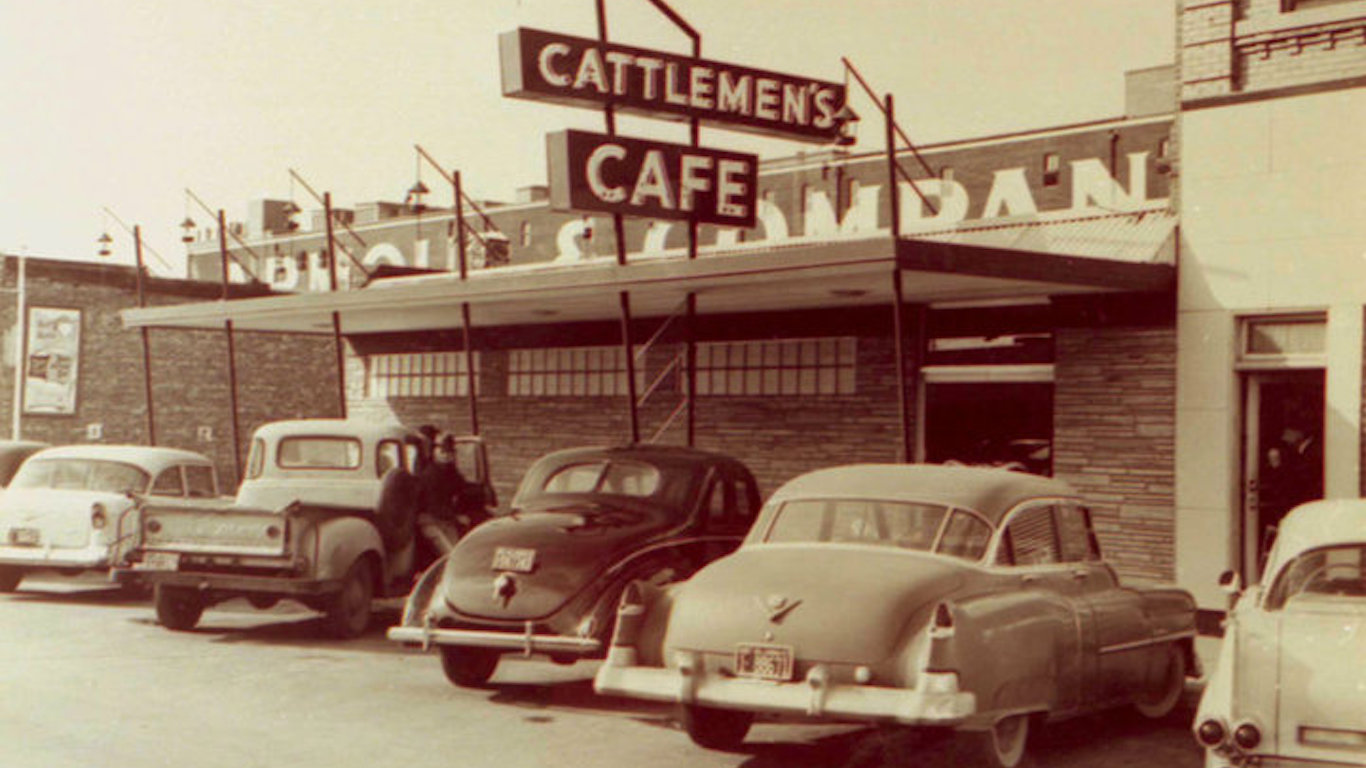
Cattlemen’s Steakhouse
> Location: Oklahoma City, Oklahoma
> Year opened: 1910
When Cattlemen’s (not to be confused with the California chain of that name) was born in 1910 as Cattlemen’s Café in Oklahoma City’s Stockyards City area, its first customers included cowboys, ranchers, and cattle haulers. Details of the restaurant’s early days are scarce, but one H.V. “Homer” Paul took possession of the place in 1926, later losing it, perhaps in a card game, to a man named Hank Frey. Frey lost the place in turn to local rancher Gene Wade Jr. in a crap game in 1945, and the Wades retained ownership for the next 45 years. An Oklahoma City restaurateur named Dick Stubbs bought the place in 1990, rebranding it from a café to steakhouse. The focus of the menu, not surprisingly, is prime or choice corn-fed Midwestern beef.
[in-text-ad]
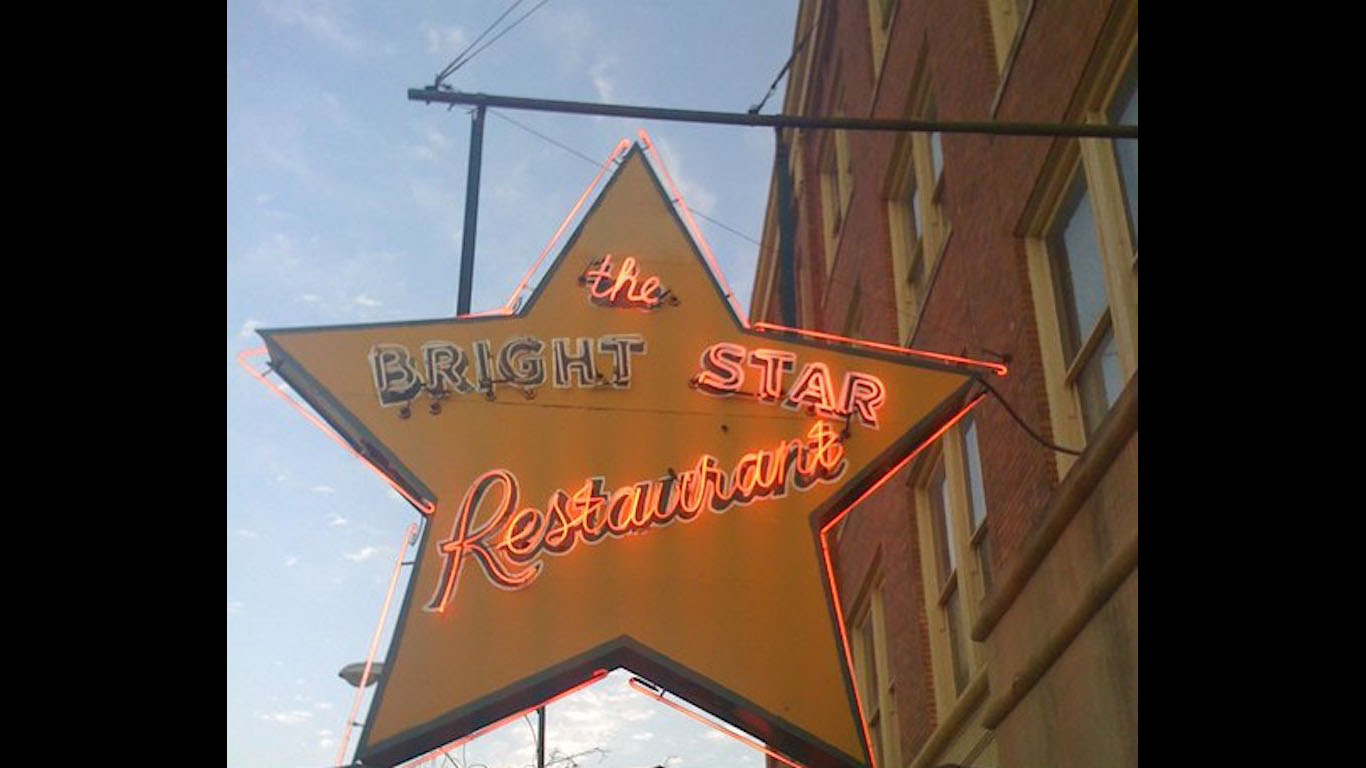
The Bright Star
> Location: Bessemer, Alabama
> Year opened: 1907
Originally a 25-seat café with a horseshoe-shaped bar, but now a 330-seat restaurant, the Bright Star was founded in this Birmingham suburb by Greek immigrant Tom Bonduris, and has been run by members of the Koikos family, also from Greece, since 1925. (Birmingham has a long history of Greek-owned restaurants.) Southern fare, sometimes with a Greek accent, is the specialty.
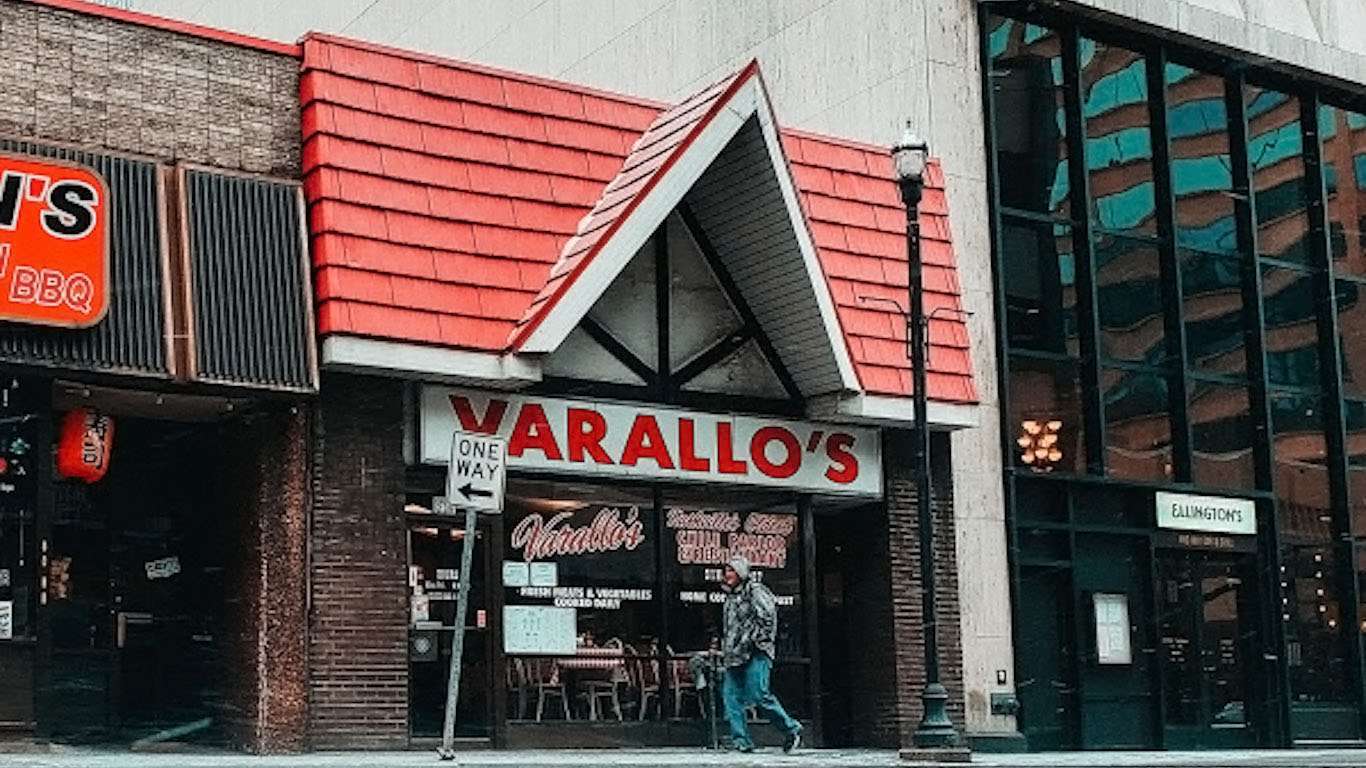
Varallo’s
> Location: Nashville,Tennessee
> Year opened: 1907
Italian immigrant Frank Varallo Sr. opened this place as Frank Varallo’s Chile Parlor 113 years ago, at one point delivering gallons of chili daily around downtown Nashville with a three-wheel Harley-Davidson motorcycle. His son, Frank Jr., took over at the age of 14 after his father died. Chili, plain or with spaghetti or and/or tamales, is still on the menu, and a variety of Southern dishes are also available. The restaurant was sold in December 2019 and is no longer in the Varallo family.

Columbia Restaurant
> Location: Tampa, Florida
> Year opened: 1905
Florida’s oldest restaurant, Columbia, was opened in Tampa’s Ybor City neighborhood by Cuban immigrant Casimiro Hernandez Sr. and is still run by his descendents. It calls itself the largest Spanish restaurant in the world. Black bean soup, tapas, and paella are among the specialties. There are now several other locations, including one at Tampa International Airport.
[in-text-ad-2]
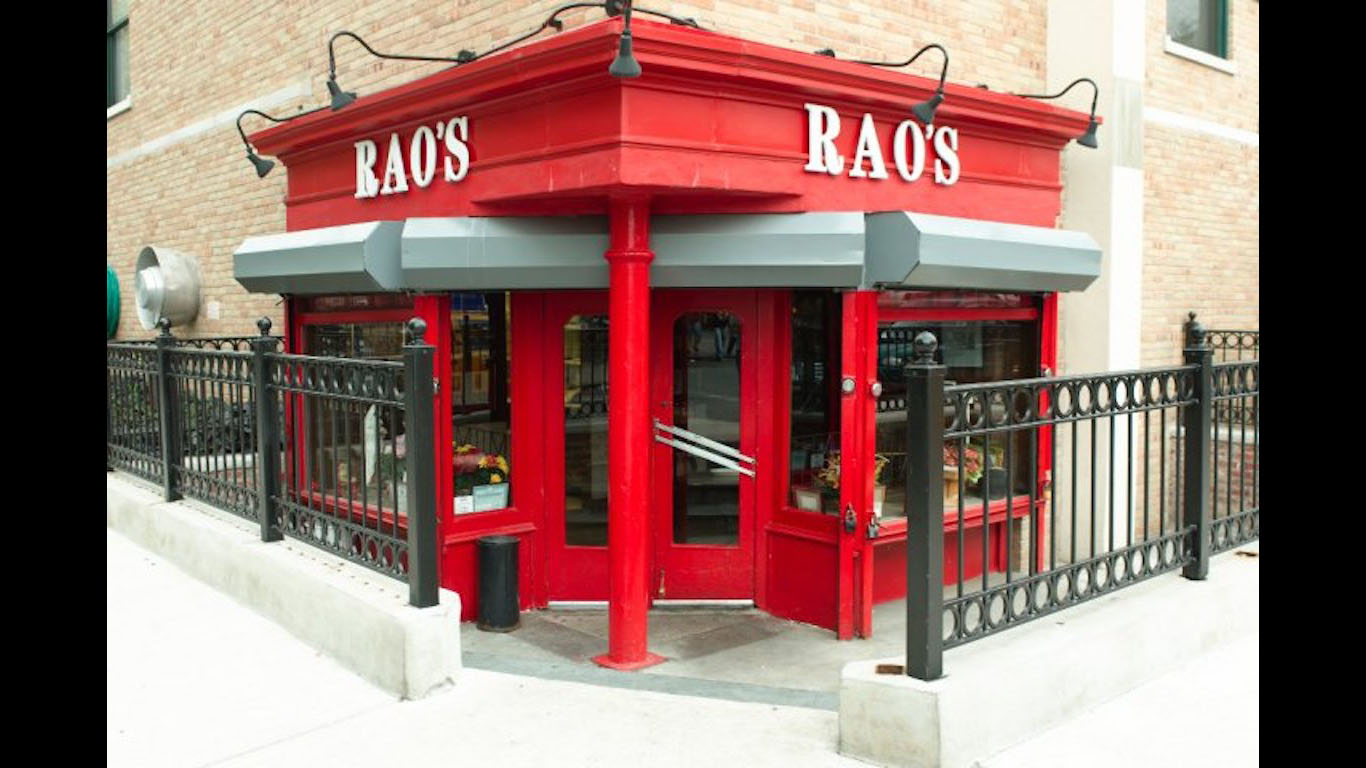
Rao’s
> Location: New York City, New York
> Year opened: 1896
Joshua Anthony Rao, an Italian immigrant, converted a small shop in East Harlem — then the largest Italian community in the city — into a modest restaurant, running it until his death in 1909. Members of his extended family are still in charge. In 1977, Mimi Sheraton, then the New York Times restaurant critic, gave the place a rave review for its unpretentious home-style Italian fare. The place, which only had eight tables (it now has 10), was overwhelmed and its longtime regular customers couldn’t get in. To remedy the situation, Rao’s became one of the country’s toughest reservations by instituting a system of holding seats for loyal locals and ceding them to outsiders only if the regulars didn’t show up.
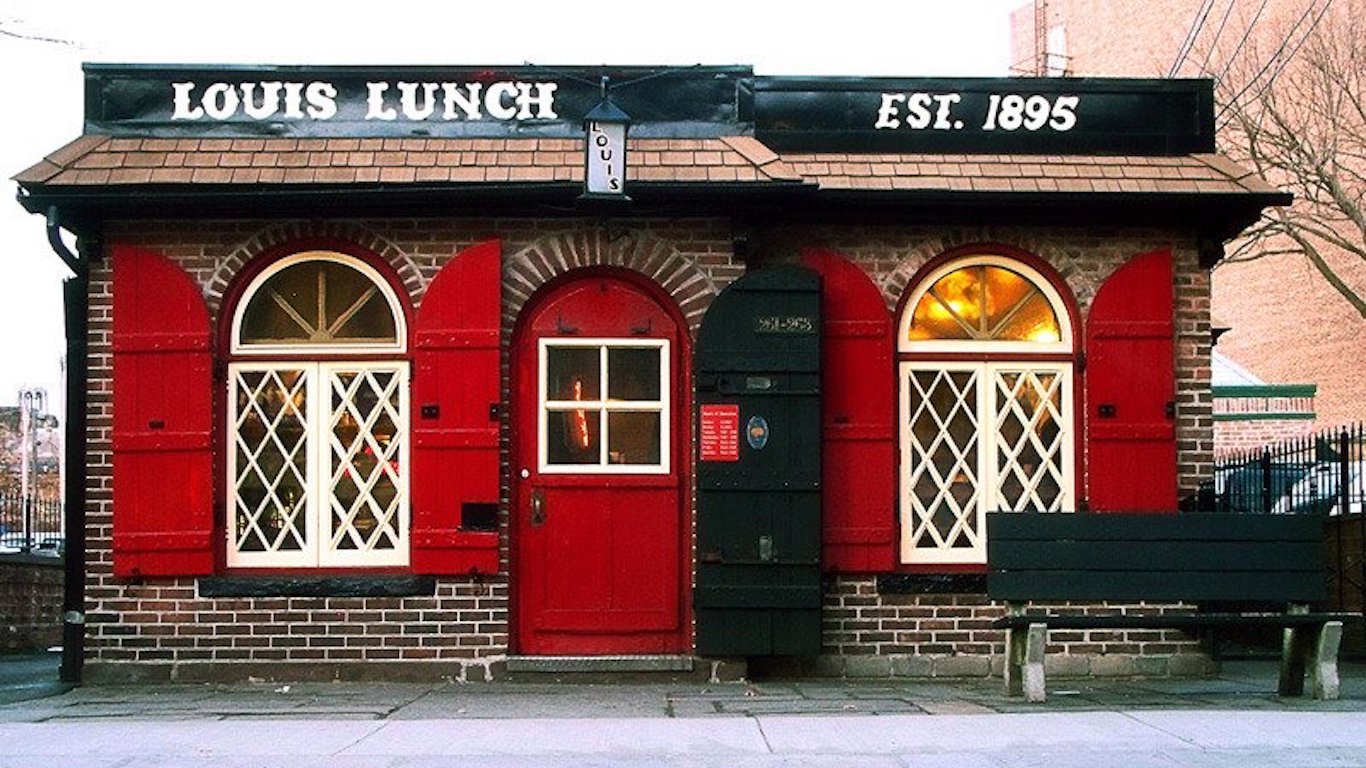
Louis’ Lunch
> Location: New Haven, Connecticut
> Year opened: 1895
Originally a walk-in lunch wagon, Louis’ is one of several establishments that claims to have invented the hamburger — in its case a ground meat patty slapped between two pieces of toast, supposedly improvised on the spot for a customer in a rush in 1900. The restaurant moved into its present building in 1917, and when it was threatened with demolition in the early 1970s, the entire structure was moved to its current location. Founder Louis Lassen’s great-grandson still runs the place today.
[in-text-ad]
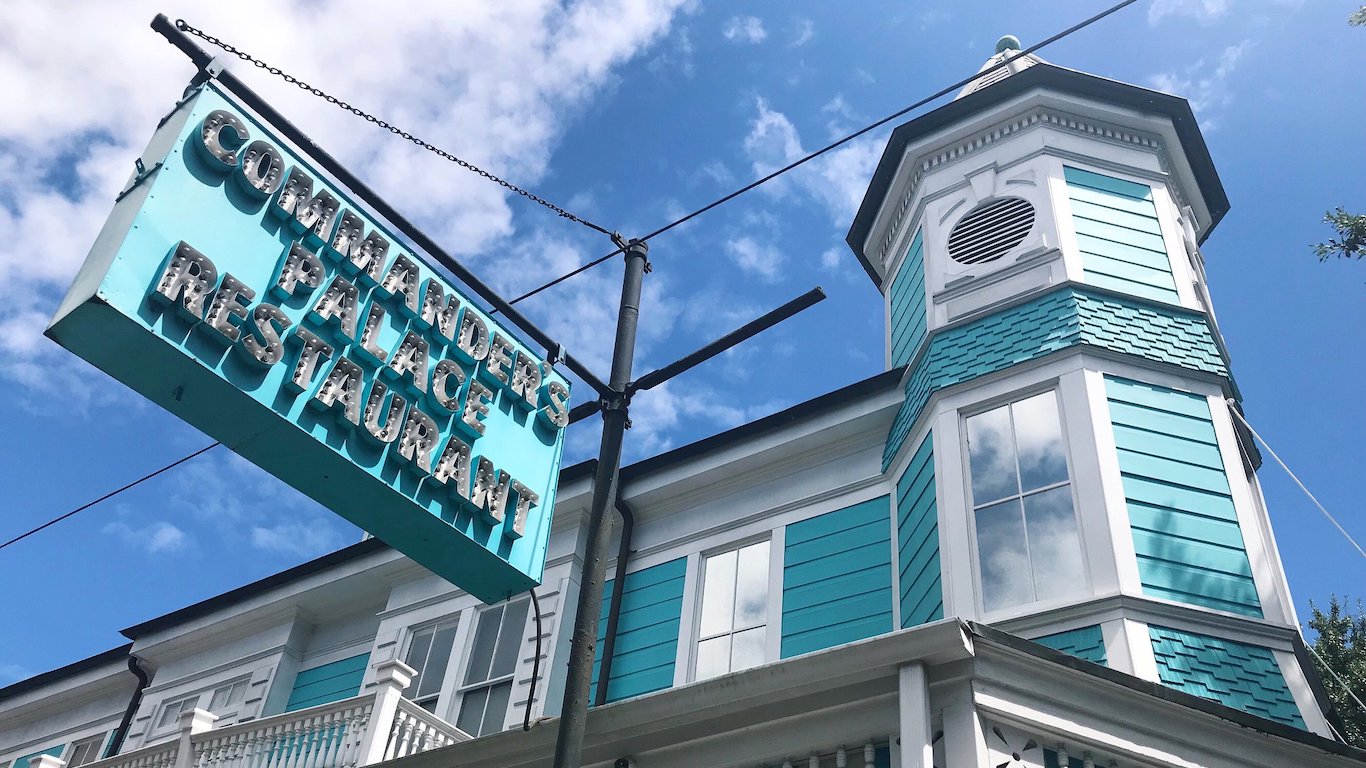
Commander’s Palace
> Location: New Orleans, Louisiana
> Year opened: circa 1893
This Big Easy classic was opened as a saloon and restaurant by one Emile Commander (a name Americanized from his Italian father’s name, Camarda.). The Brennan family, New Orleans restaurant royalty, took the place over in 1974. Among the notable chefs who have run the kitchen since then are Paul Prudhomme, Emeril Lagasse, and Frank Brigtsen. Complex modern Creole food (Cognac-flambéed crawfish with cornbread spaetzle, blue-crab-crusted flounder with marinated artichokes) is the focus.
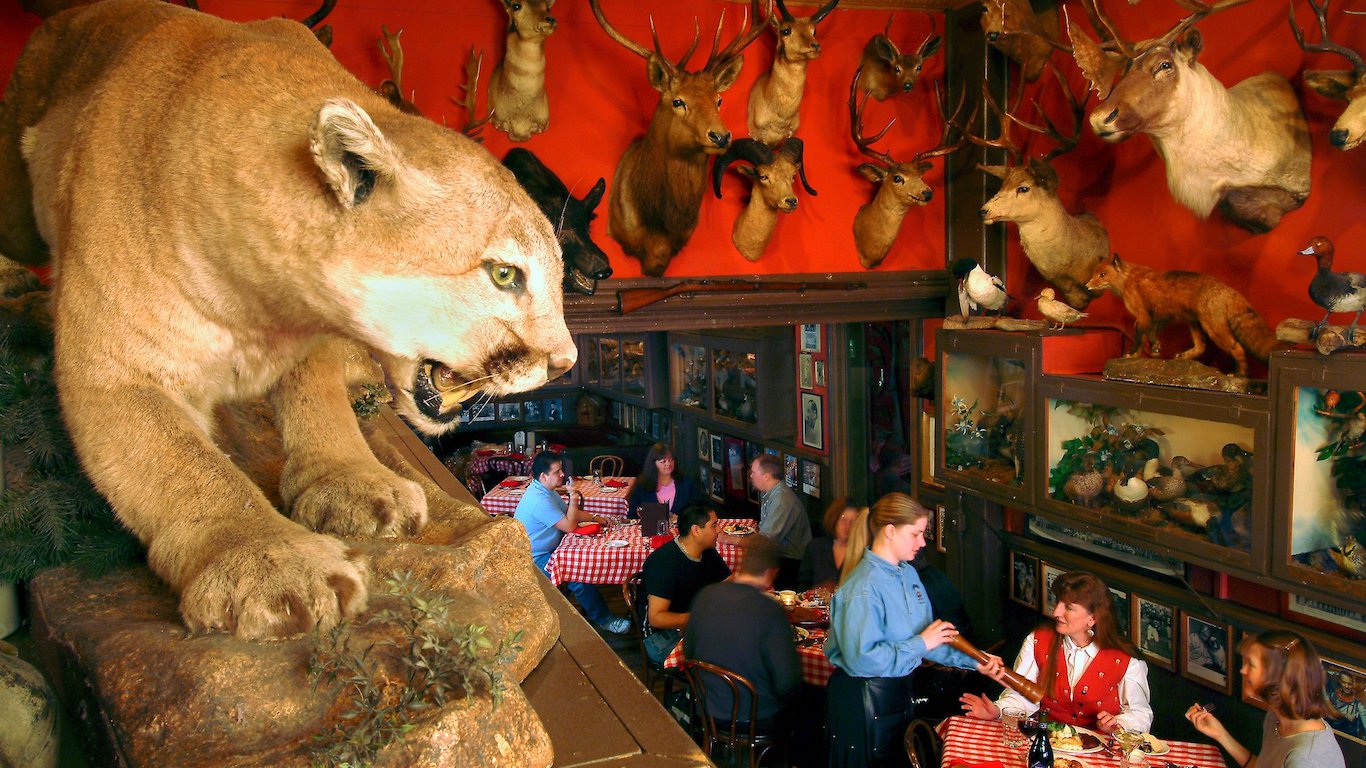
The Buckhorn Exchange
> Location: Denver, Colorado
> Year opened: 1893
The holder of Colorado liquor license No. 1, the Buckhorn was founded by a one-time scout for Buffalo Bill Cody, Henry H. Zietz. His son, Henry Jr., took the place over after Zietz died in 1949, selling it to a group of local investors in 1978. Steaks (both beef and buffalo), elk, quail, and sometimes ostrich and yak are on the bill of fare. Due to COVID restrictions in Denver, the Buckhorn Exchange is temporarily closed until further notice.
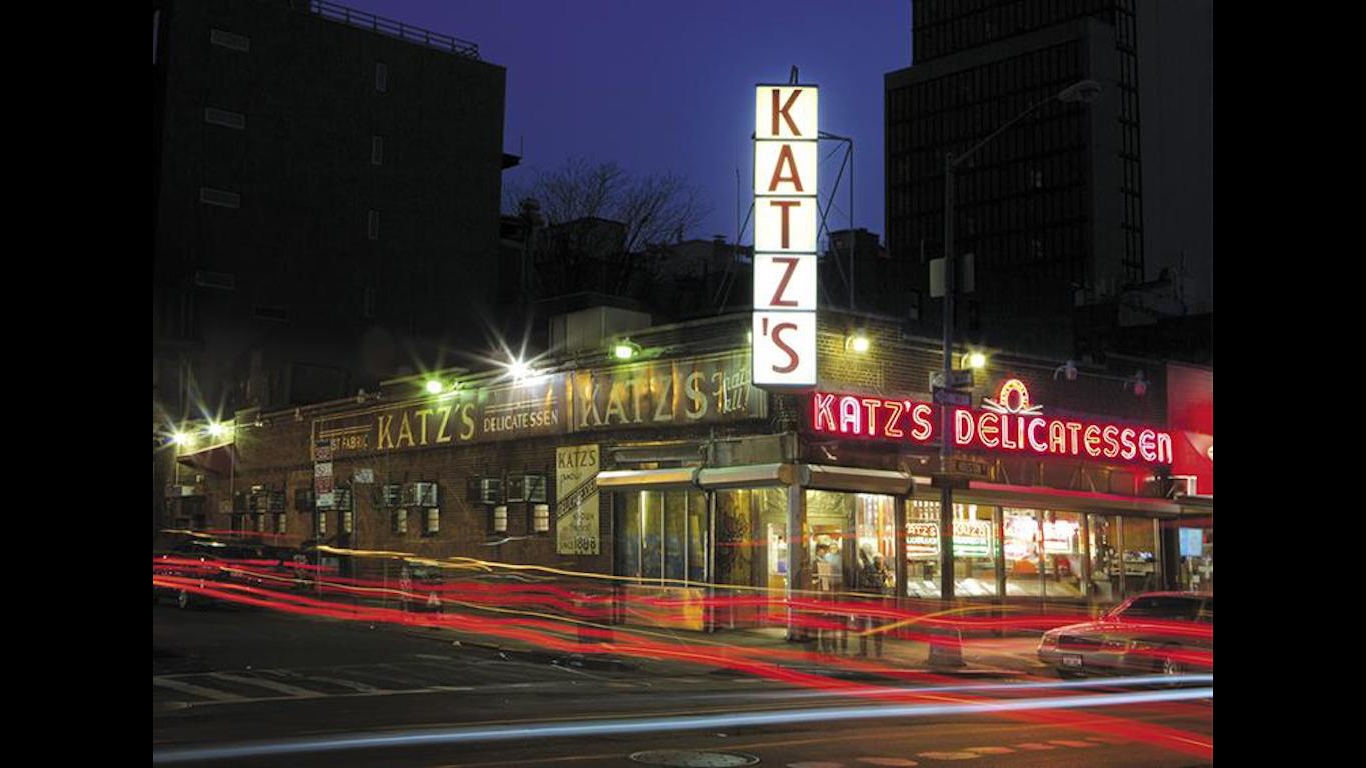
Katz’s Delicatessen
> Location: New York City, New York
> Year opened: 1888
First opened as Iceland Brothers (by, not surprisingly, brothers of that name), this landmark Lower East Side deli became Iceland & Katz when Willy Katz invested in the place in 1903. In 1910, Willy’s brother Benny joined the business, and the two bought out the Icelands and renamed the deli Katz’s. Another partner, Harry Tarowsky, came on in 1917. Harry’s son and Benny’s son-in-law took over management in the late 1970s, but sold the place to new owners in 1988. All the deli classics — matzo ball soup, chopped liver, corned beef and pastrami sandwiches, brisket, and the rest — are served.
[in-text-ad-2]
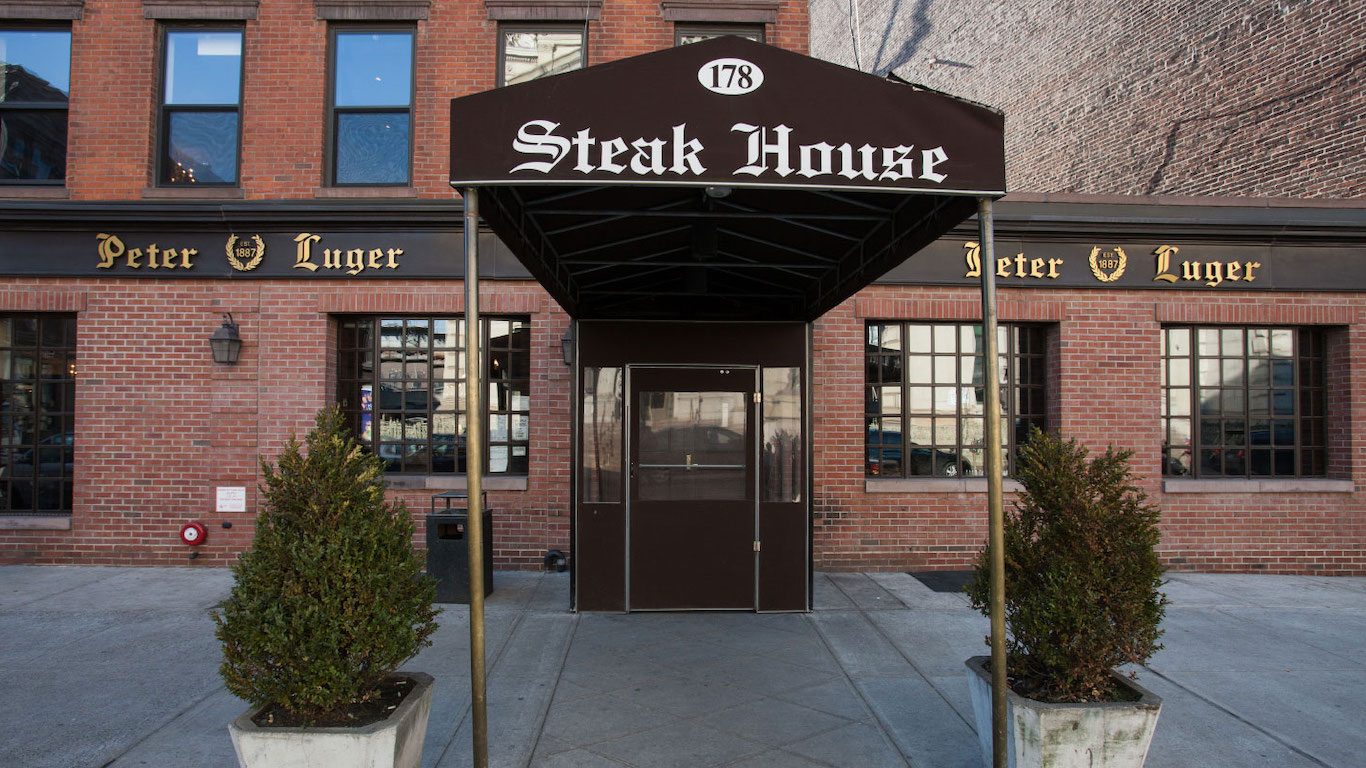
Peter Luger Steak House
> Location: Brooklyn, New York
> Year opened: 1887
German immigrant Carl Luger opened this landmark, in what was then Brooklyn’s predominantly German neighborhood of Williamsburg, as Carl Luger’s Café, Billiards and Bowling Alley. After his death, his son Peter took over and renamed the restaurant after himself, transforming it into a steakhouse. (Peter’s nephew, another Carl, was the chef.) Upon Peter’s death in 1941, ownership was assumed by his son Frederick, but it lost its luster and in 1950 it was bought and revivified by a regular customer, Sol Forman. His family still owns what has become a Brooklyn institution.
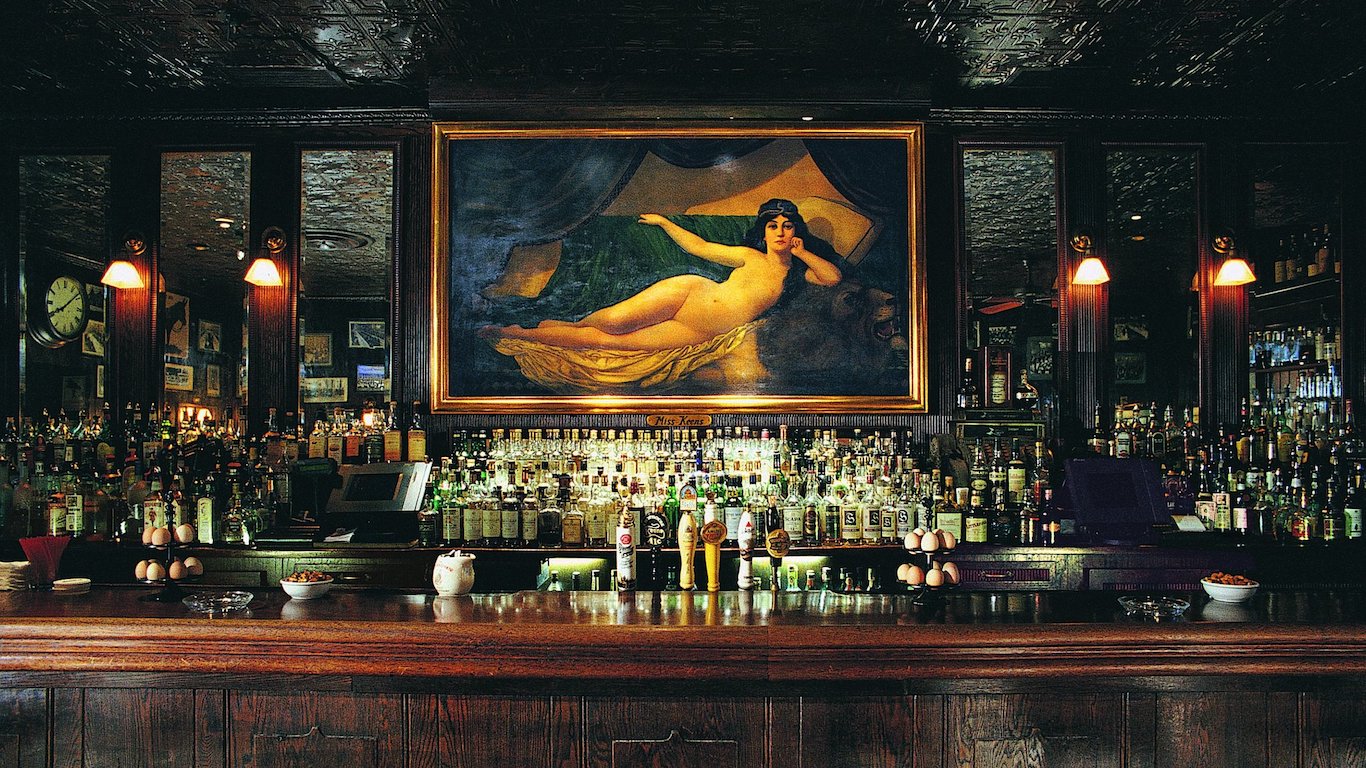
Keens Steakhouse
> Location: New York City, New York
> Year opened: circa 1885
Founded as Keen’s English Chop House by theatrical producer Albert Keen in what was then the Herald Square Theatre District, Keens changed its descriptor to “Steakhouse” in 1995. Its most famous dish for many decades, however, has been the “mutton chop.” Originally a slab of mutton (the meat of sheep at least two years old), it’s now a thick chop of regular (younger) lamb. Keens is also famous for its collection of long-stemmed white clay pipes, which back in pre-smoking-ban days were kept there for the use of customers — including everyone from Teddy Roosevelt to Babe Ruth to Albert Einstein. The restaurant declined, and almost closed in the 1970s, but restaurateur George Schwarz bought and renovated it. Schwarz died in 2016. His estate owns the restaurant, and longtime manager Bonnie Jenkins runs it.
[in-text-ad]
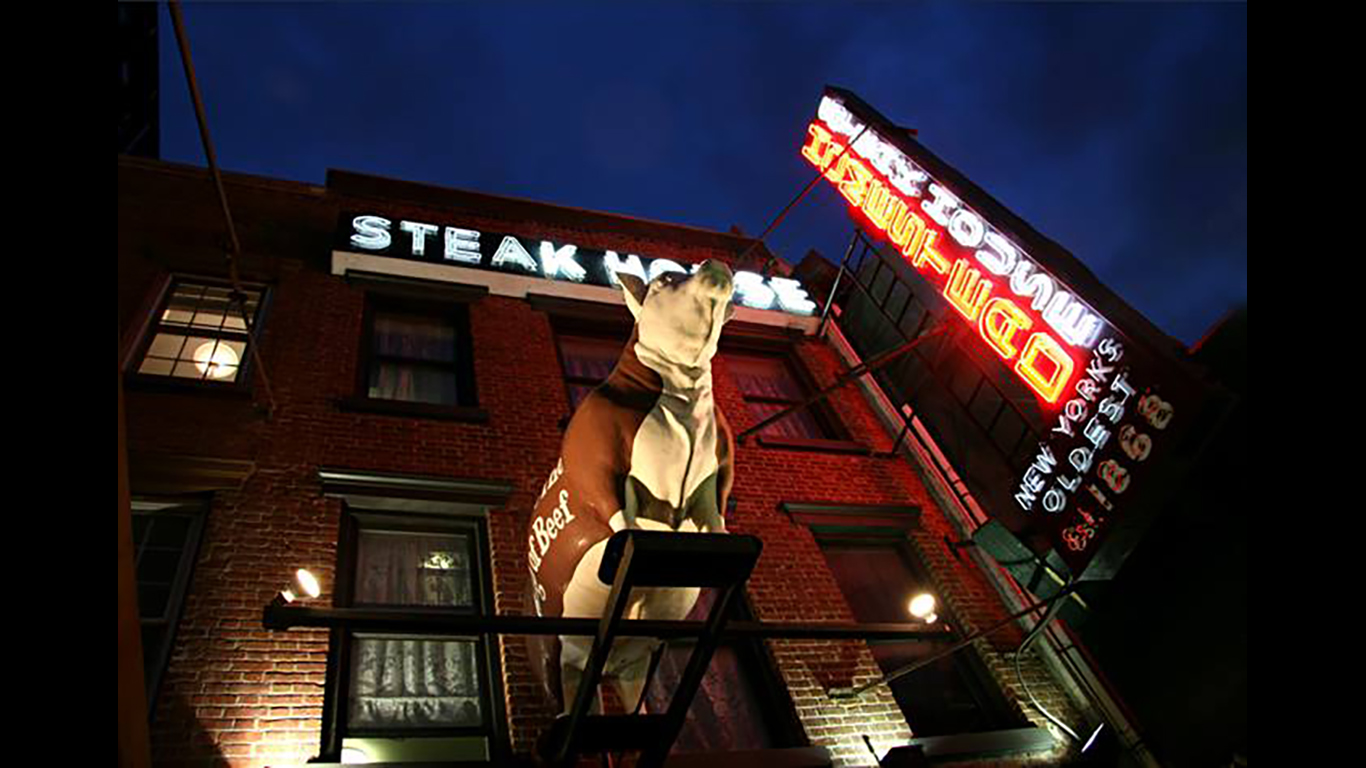
Old Homestead
> Location: New York City, New York
> Year opened: 1868
The oldest continuously operating steakhouse in America, and arguably the oldest restaurant in New York City, the Old Homestead was originally a tiny restaurant, operated by the Heinz family as part of the Tidewater Trading Post, serving what was then the waterfront (the Hudson River once reached nearly to its doors). The place expanded as the river receded, growing into a full-scale steakhouse, and in the 1940s, it was bought by a longtime employee, Harry Sherry. His grandsons own and operate it today.
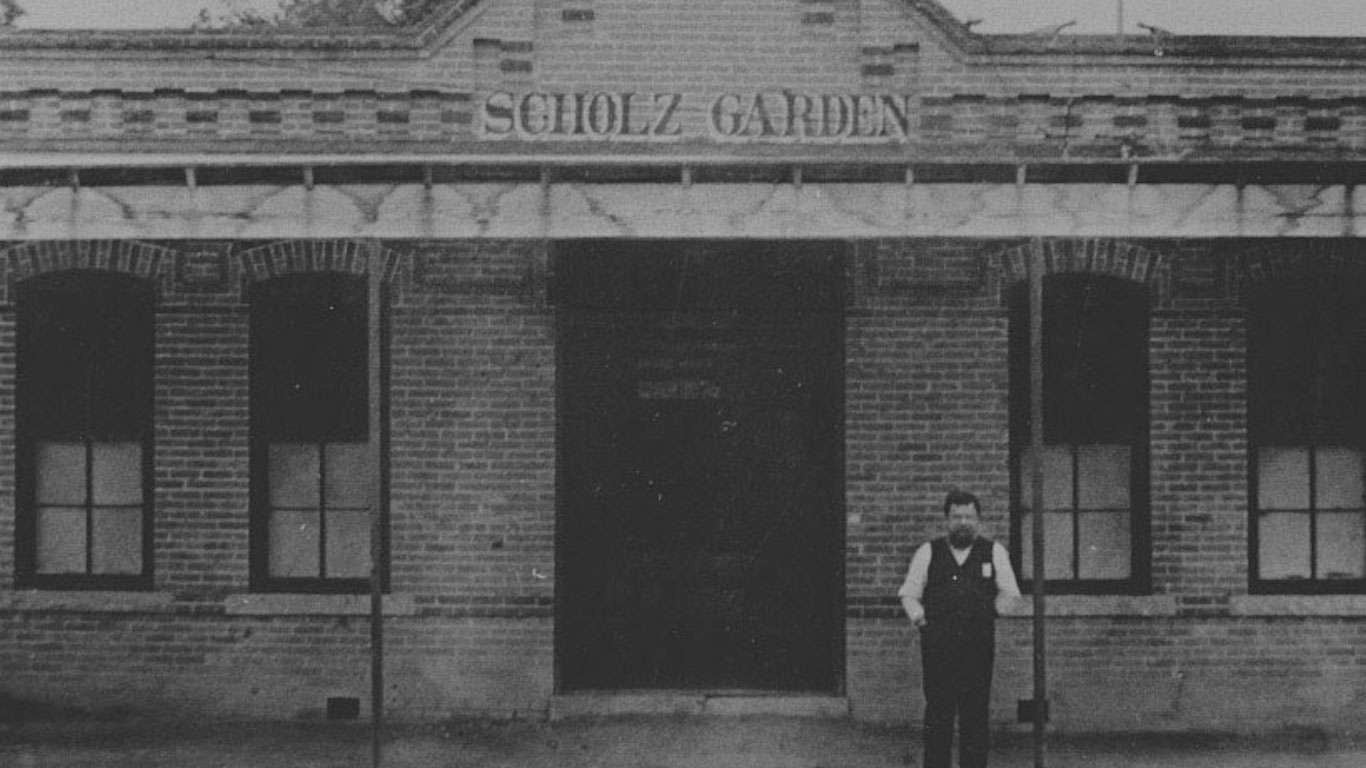
Schloz Garten
> Location: Austin, Texas
> Year opened: 1866
Said to be not just the oldest restaurant but the oldest continuously operating business of any kind in Texas, this beer garden and eating place was opened by German immigrant August Scholz just after the end of the Civil War. A German choral society, the Austin Saengerrunde, bought it in 1914, and retains ownership of the building to this day — though three Austin businessmen took over the business lease in 1987. Daniel Northcutt, former owner of the now-closed hot-dog-centered restaurant Frank, operates the place — where the menu offers both German and Texas specialties (Wienerschnitzel as well as a Texas sausage plate).
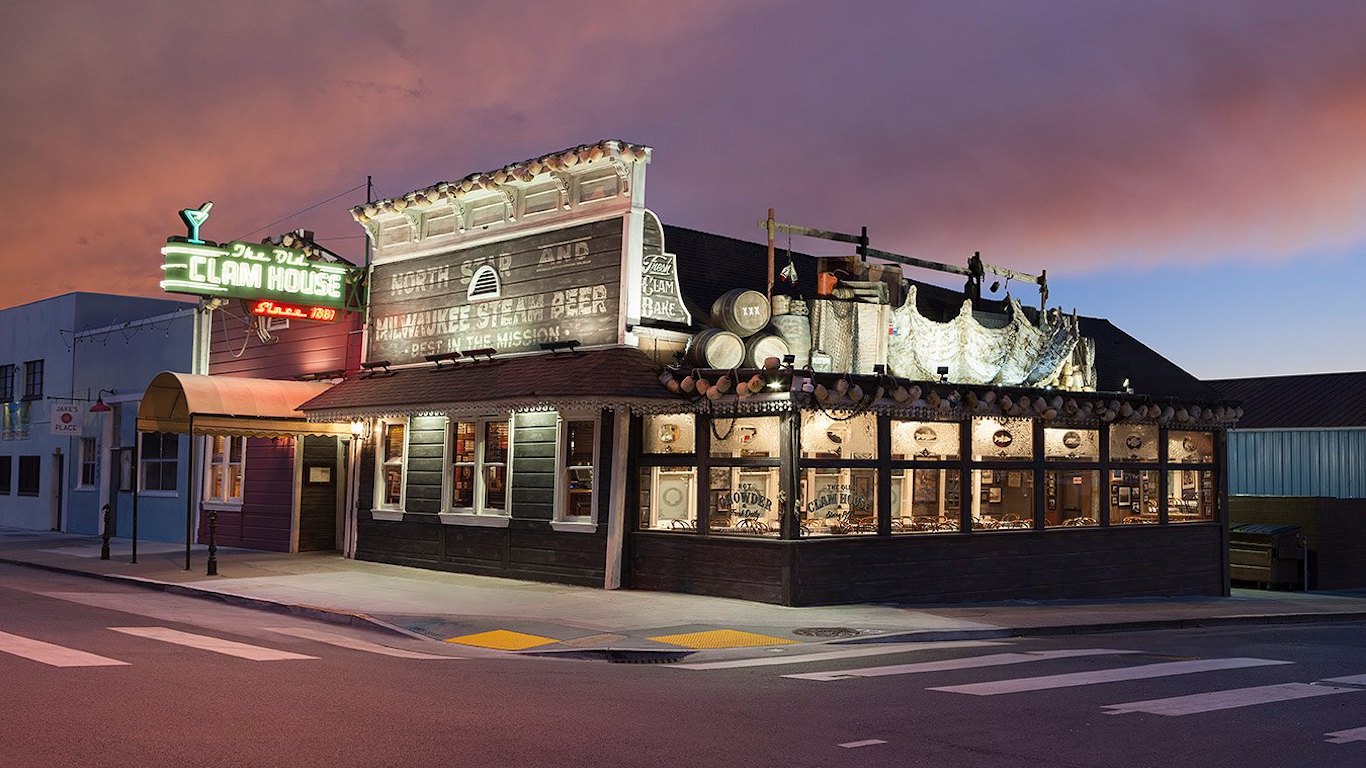
The Old Clam House
> Location: San Francisco, California
> Year opened: 1861
While Tadich Grill (see below) is San Francisco’s oldest restaurant, purists point out that it has changed location on numerous occasions, whereas the Old Clam House’s bar area dates from the restaurant’s founding year of 1861, so it’s technically the oldest place in the same location. Originally called the Oakdale Bar, the restaurant was run by Ambrose Zurfluh and his wife, Anna Imhof Zwyssig. She was in charge of the food, putting out homemade soup, hard-boiled eggs, and other fare for the customers, along with clams and oysters from the bay. Since 2011, local restaurateur Jerry Dal Bozzo and his wife, Jennifer, have been in charge. They remodeled the place and updated the menu to include sizzling seafood platters and garlic roast crab. The Old Clam House is temporarily closed due to COVID-19.
[in-text-ad-2]
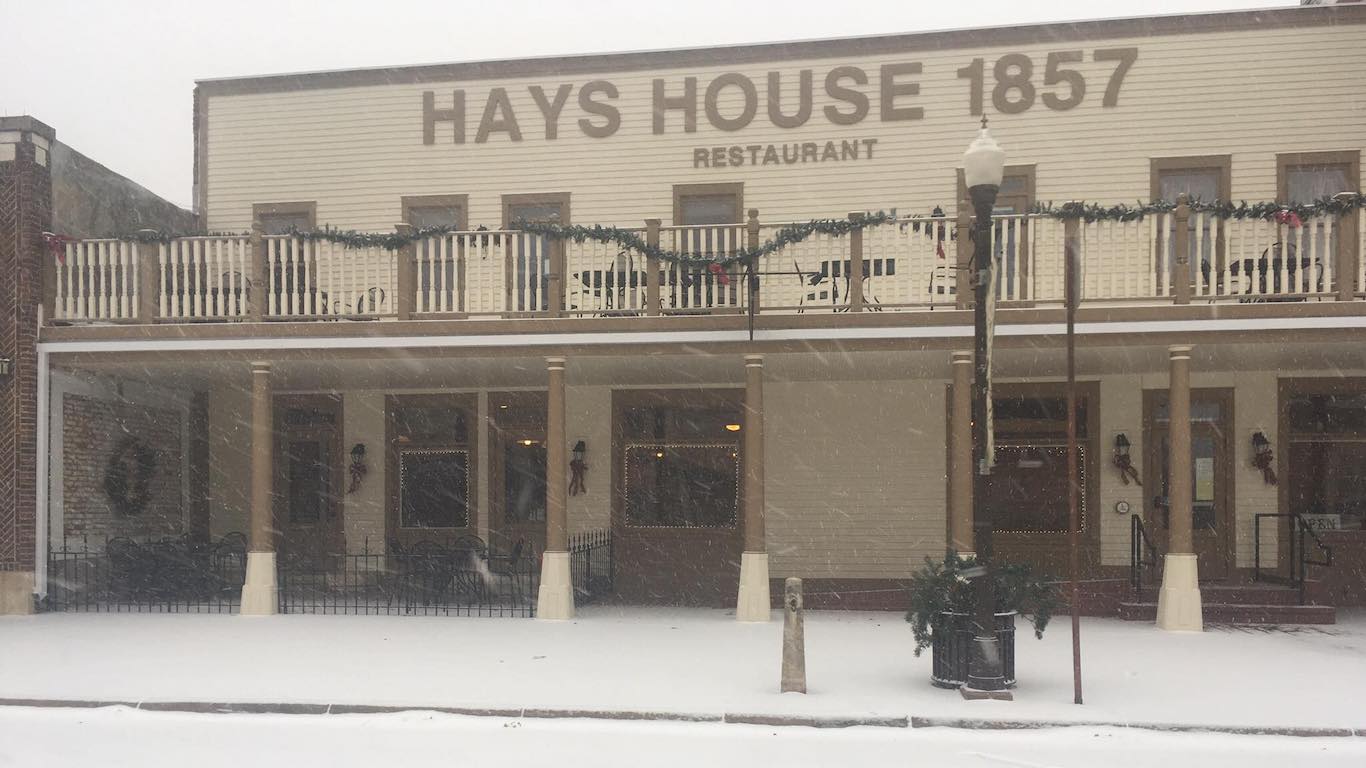
Hays House
> Location: Council Grove, Kansas
> Year opened: 1857
Opened by frontiersman Daniel Boone’s great-grandson, Seth Hays, as a trading post and food-serving tavern with rooms, Hays House also housed a post office and a barber shop at various times, and served as a venue for religious services and theatrical performances. Jesse James and General Custer are reported to have been among its early customers. The restaurant, which serves burgers, steaks, and other American fare, has been damaged by fire and restored three times over the years. The kitchen was destroyed by a conflagration in 2011, and the place might have closed permanently — but a group of 25 local residents formed an investment group to buy and reopen it.
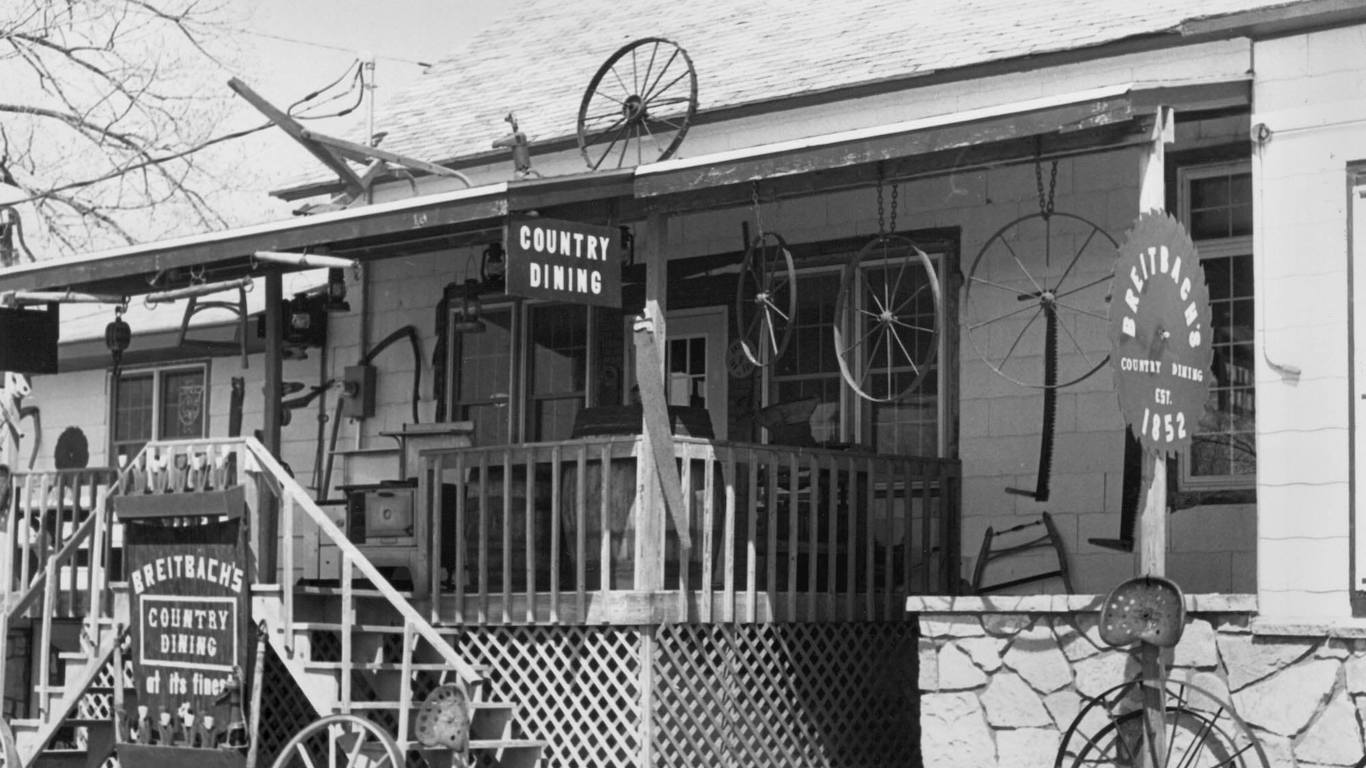
Breitbach’s Country Dining
> Location: Balltown, Iowa
> Year opened: 1852
According to Breitbach’s official history, the place was opened as a stagecoach stop in 1852 “by federal permit issued from President Millard Fillmore…” Its original name is unknown, but it has been Breitbach’s since the Breitbach family bought it in 1862. Remarkably, their descendents still own it. Steaks and seafood are featured and the pies are homemade.
[in-text-ad]
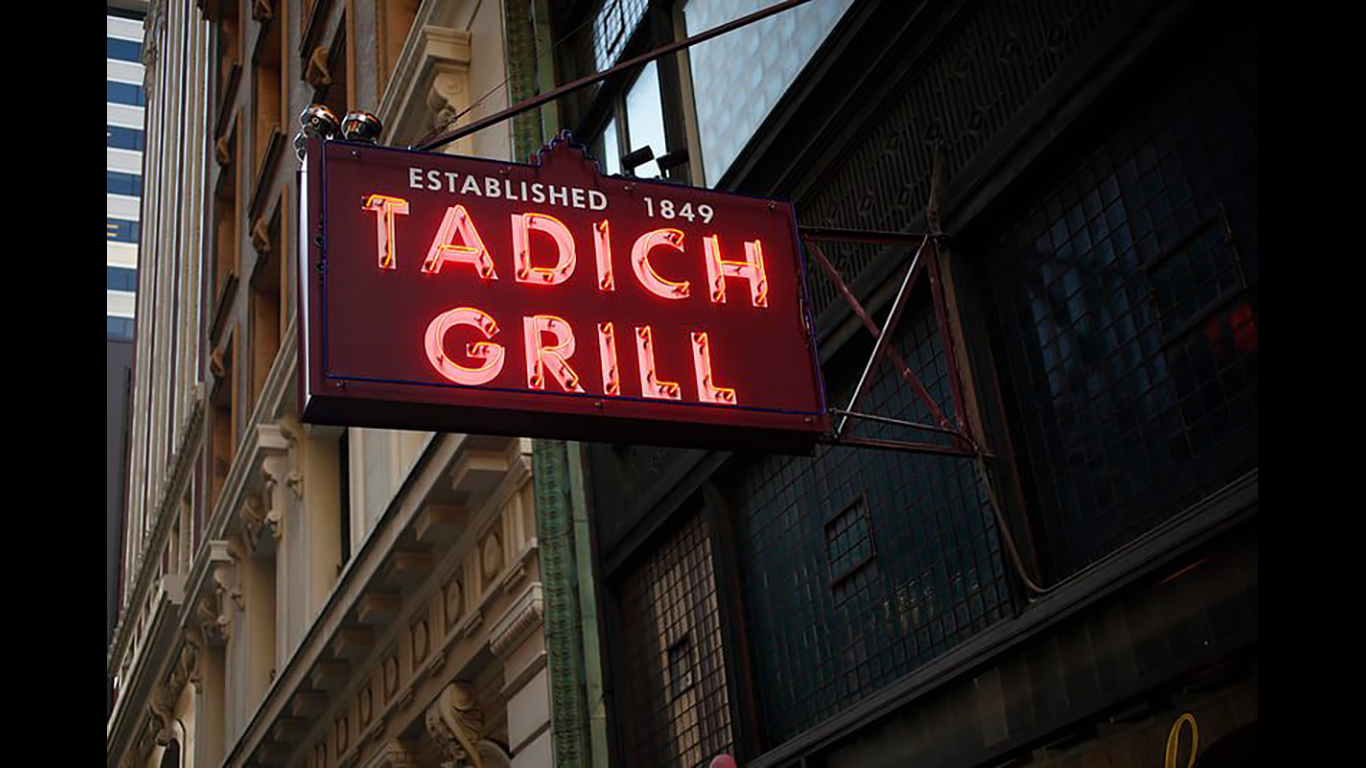
Tadich Grill
> Location: San Francisco, California
> Year opened: 1849
Considered not just San Francisco’s but California’s oldest restaurant, Tadich Grill was originally a tent called simply Coffee Stand, opened back in Gold Rush days by three Croatian immigrants. (Its name notwithstanding, it served fresh grilled fish, among other dishes.) It moved a number of times over the next few decades, becoming the New World Coffee Saloon and then the Cold Day Restaurant. Another Croatian, John Tadich, bought and renamed the place after himself in 1887. In 1928, still another Croatian, John Buich, bought Tadich Grill, and the Buich family continues to run it today. The menu focuses on Dungeness crab, petrale sole, and other seafood. The restaurant is currently closed due to COVID-19 and will reopen when 50% indoor seating capacity is allowed in the city.
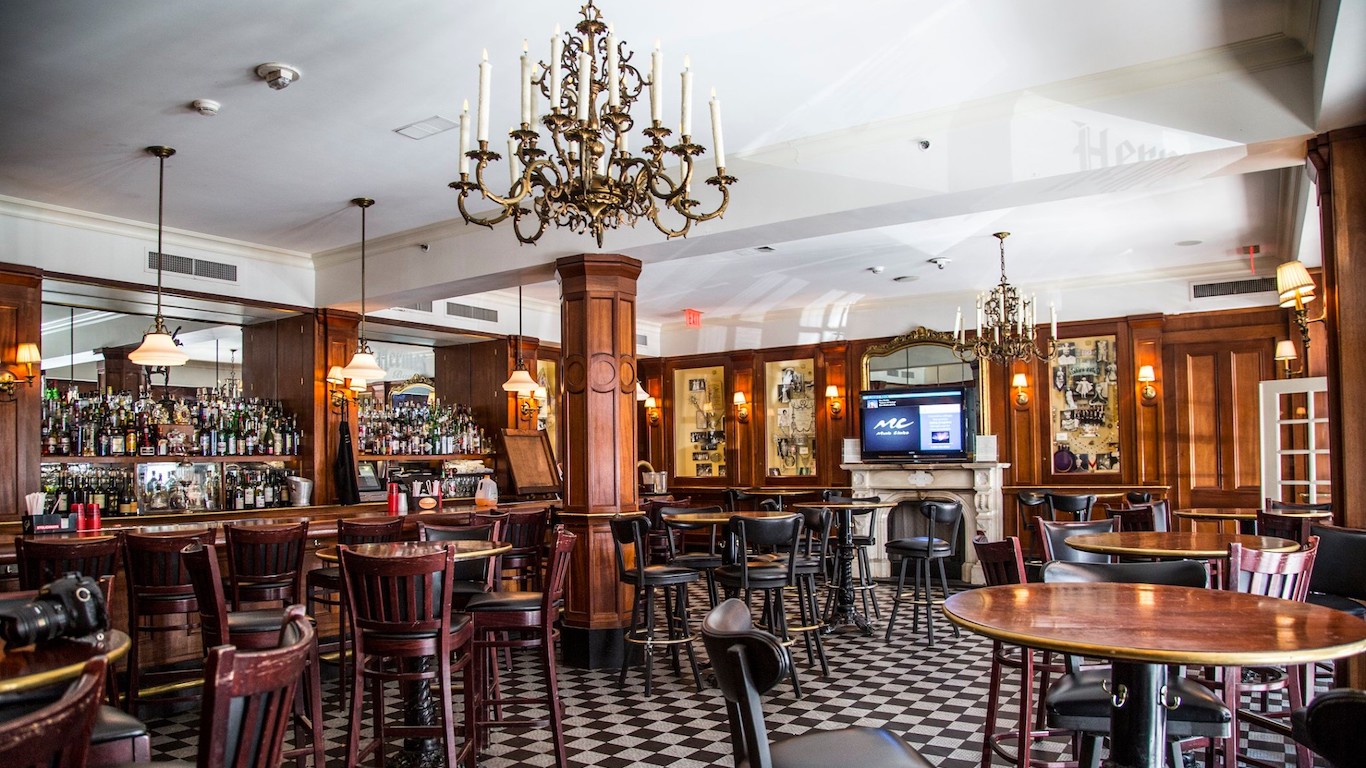
Antoine’s
> Location: New Orleans, Louisiana
> Year opened: 1840
The country’s oldest family-run restaurant, and by some definitions the oldest restaurant, period, Antoine’s was opened a block away from its current French Quarter location by 18-year-old Antoine Aciatore, an immigrant from France, and his wife, Julie. She and later their son, Jules, took over the place after Antoine’s health failed in the 1870s. Jules’ son Roy succeeded him and ran Antoine’s until 1972. Roy’s grandson Rick Blount became CEO and proprietor in 2005. The menu of rich Creole specialties includes oysters Rockefeller and eggs Sardou, two famous dishes invented here.
Cash Back Credit Cards Have Never Been This Good
Credit card companies are at war, handing out free rewards and benefits to win the best customers. A good cash back card can be worth thousands of dollars a year in free money, not to mention other perks like travel, insurance, and access to fancy lounges. See our top picks for the best credit cards today. You won’t want to miss some of these offers.
Flywheel Publishing has partnered with CardRatings for our coverage of credit card products. Flywheel Publishing and CardRatings may receive a commission from card issuers.
Thank you for reading! Have some feedback for us?
Contact the 24/7 Wall St. editorial team.
 24/7 Wall St.
24/7 Wall St.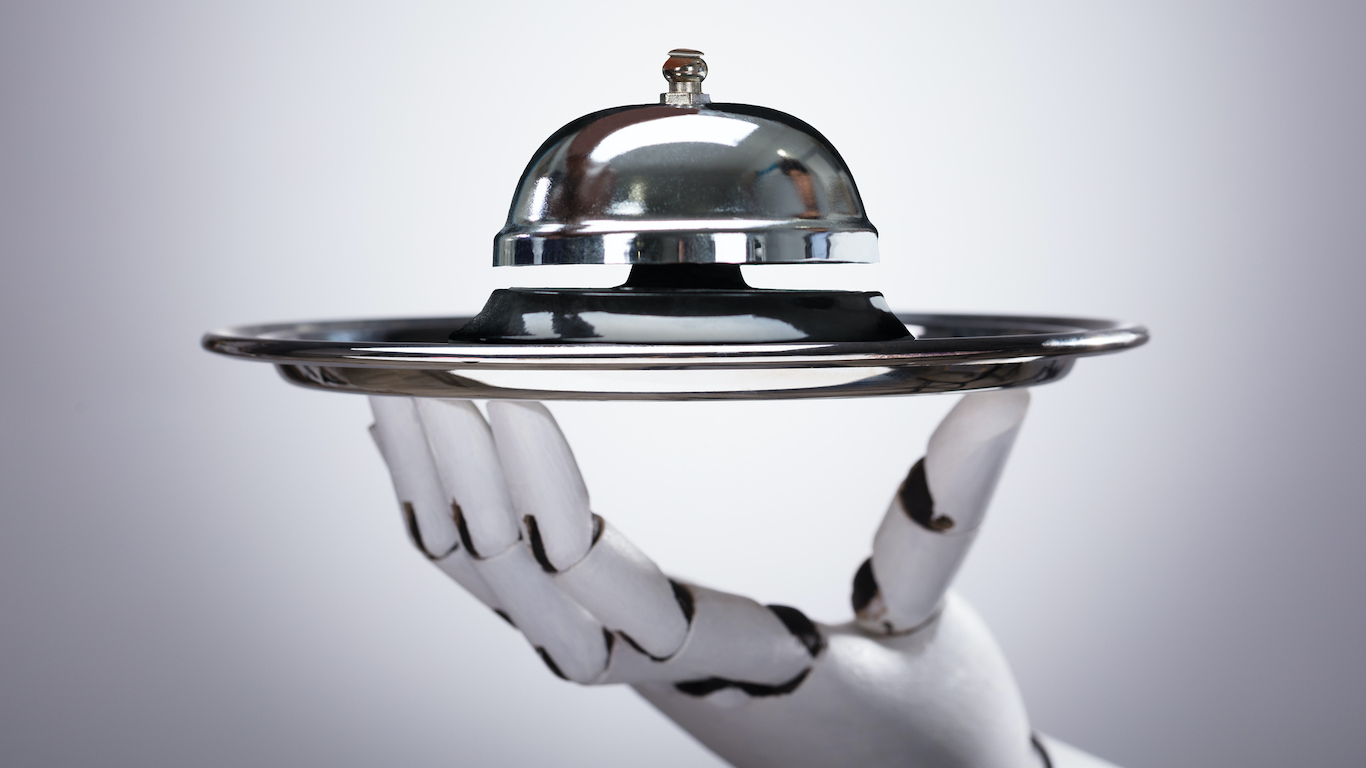 24/7 Wall St.
24/7 Wall St.


